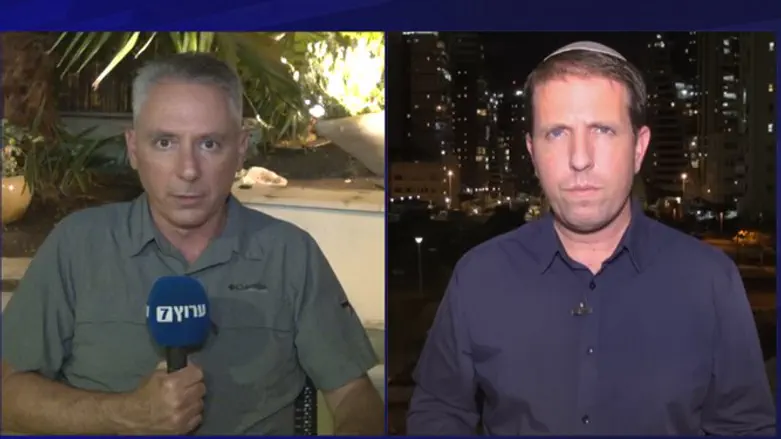
As part of the project to summarize the Jewish year of 5780, we spoke with Channel 13 News security commentator Alon Ben-David about events of the past year in terms of security. From the outset he defined the year as one of the quietest in recent decades, despite events in the Gaza Strip.
When asked to put his finger on the single most significant security incident of the past year, Ben-David recalls the days just before coronavirus, Operation Qassem Suleimani: "We received from the United States the greatest gift we could have received."
"People don't understand its meaning. There are people who have no substitute. He was the Shiite axis contractor engineer and architect. He takes a plane from Tehran to Iraq and appoints an Iraqi prime minister, flies to Irmil and makes a sulha reconciliation among the Kurds, continues to Damascus to help Assad, moves to Beirut to give Nasrallah missiles, continues to the Houthis in Yemen to help them. It was a rare combination of diplomatic and military prowess along with a very charismatic personality, and since he left the Shiite axis we see this axis in its weakness. His replacement doesn't even come close to these capabilities. It's a very significant event for Israel."
Ben-David sees Suleimani's assassination as the beginning of the Shiite axis' withdrawal and "if pressed, they will move back."
He says the Iranians without Qassem have limited capabilities, including no ability to respond to Israel's activities. In such a reality Nasrallah becomes the escalating factor in the region.
"In the end, what brought calm to this year was the coronavirus that educated us that there are greater things than origin, religion, and borders. An outbreak in Tulkarm or Gaza can radiate to us. Coronavirus gave us all a lesson in modesty," says Ben-David, who claims that this spirit permeated the lone terrorist. "Life is stronger than ideology."
In this context he mentions the dramatic events that have taken place in recent years to the Palestinians, relocating the American embassy to Jerusalem, the Trump Plan, announcements of annexation, magnetometers on the Temple Mount and more, and yet the area is still quiet "because people live and work. They have a life. The IDF turns a blind eye to one hundred thousand people who cross the separation fence to work in Israel, because they understand that these people have no interest in doing evil. They earn a decent living, a person in Shechem who washes dishes in Tel Aviv earns six times what he would earn in Shechem, so they want to be here. We also saw the influx from Tulkarem to the sea."
As for what is happening on the northern front, Ben-David says that there is an Israeli decision not to acknowledge attacks so as not to burden Assad with the need to respond, and on the other hand there is a decision for Israeli attacks not to cause casualties, to the point that Israel informs the Syrians before attacking of the location with a recommendation to exit within a minute. "Assad swallows the bitter pill of the Israeli attacks, but he understands that with the amount of attacks and the destruction of his forces, it still isn't worthwhile for him to react because his missile batteries are being destroyed and he has no money to buy a new anti-aircraft gun from the Russians.
"The most amazing thing about this event is the reaction of the Russians who aren't in this story. The Russians don't like the attacks in Syria but they respect us. They see before them a country willing to use force and they respect that; they see before f them a country that has cultural affinity towards them a country with a million-and-a-half Russian speakers, and it does something to them. When we attack Syria and the coordination mechanism informs the Russians about the attack, Assad shoots everything he has like a lunatic and the Russians aren't in the game. That is the essence of the ambiguity. We don't stick a finger in the eye and we do not tell the Russians their defense systems are worthless."
For Ben-David, this means that in the Middle East, as in the Middle East, only "power is something that's respected," recalling the respect for American power since Trump restored its capabilities. "It makes the U.S. election very, very dramatic. If there's a re-election you can bring about a new nuclear deal much better for Israel. A choice for Biden who says he intends to bring back Obama's agreement will establish a regression for the whole region. Iran will return to a strong economy to spread in the region. Therefore the U.S. election is super-dramatic for the Middle East. So I very much hope we get another four years of this administration that corrects a lot of the mistakes of the two governments that preceded it."
On the army's handling of the coronavirus outbreak, Ben-David says that the incident has implications for many aspects of our lives, and for that purpose we need to weigh all the considerations at the national level before making decisions. Ronni Gamzu and the military can each make decisions with such a vision in mind. For now, he believes, Israel is not coping in this way, "I'm very worried that the treatment of coronavirus is political and the consequences we are all experiencing."
